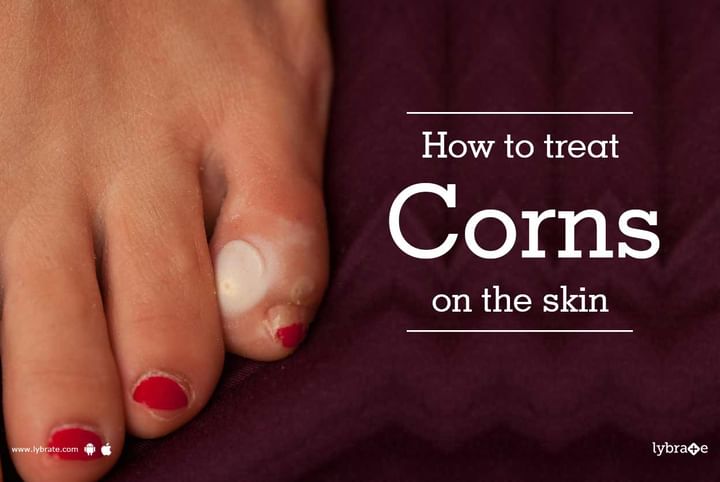How to Treat Corns on the Skin
Corns are small circular patches of thick, hardened skin that generally develop on the toes or soles of feet. They may occur anywhere else on the body. They might be caused due to friction and pressure which may occur, if you wear poorly fitted shoes or as a symptom of some other conditions such as bunions (big toe bent towards other toes) or hammer toe (toe bent at the middle joint).
Corns, especially on feet will not get cured unless its root cause is treated. If left untreated, the skin becomes thicker and more painful. Cures for corns will depend on the cause or nature of the corn. Here are some effective ways to treat most types of corns.
1. Removal of hard skin: A dermatologist can help remove the thickened skin with a scalpel, which will relieve the pressure on the affected tissue.
2. Products that treat corns: Some foot care products are specially designed to allow your skin heal and to redistribute the excess pressure that is causing the corn. These may be prescribed by your dermatologist for quick healing of your corns. Some of these products include:
a. Rehydration creams that soften thickened skin
b. Soft padding or foam insoles that can be inserted into shoes
c. Corn plasters that provide protection
d. Small foam wedges which can be placed between toes to cure soft corns
e. Special silicone wedges that change the position of your toes and help in redistribution of pressure.
3. Salicylic acid: Salicyclic acid, contained in several over-the-counter products is helpful in softening the first layer of dead skin, thereby facilitating its removal. Products containing salicylic acid should not be used if you suffer from conditions that cause circulation problems, such as diabetes, peripheral neuropathy or arterial disease. If you have cracked or broken skin in the area of the corn or sensitive skin, salicyclic acid is not suitable for you either.
You can prevent corns by practising proper foot care, as your feet carry the weight of the entire body and are very susceptible to problems. Using a pumice stone regularly to rub away hard, dead skin is a good way to prevent corns and bacteria. Wearing properly fitted shoes is a must to prevent corns. If you wear heels very often, they may put excessive pressure on your feet. If you suffer from diabetes or other diseases causing circulation problems, do consult a doctor as corns and infections in the feet can lead to more severe infections.



+1.svg)
